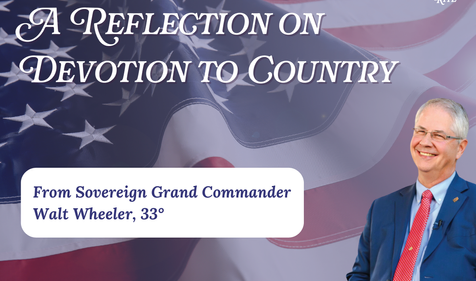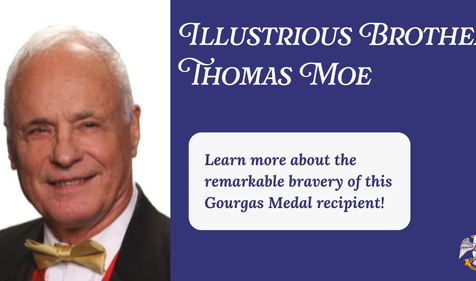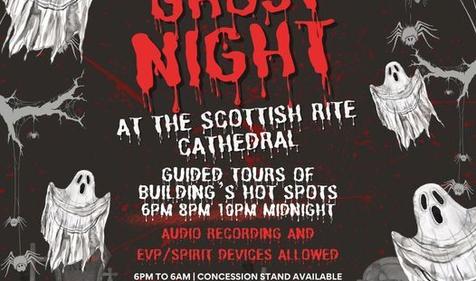Haut Grades Academy Series: From the Desk of…Arthur Fred Hebbeler, 32°. Please join us in learning about the degree of The 4 Chaplains and its relationship to the Scottish Rite’s core values. The essay by Bro Hebbeler is drawn from his writings in HGA Level 2.
The Hauts Grades Academy (HGA) is in full swing and our participants have already completed many of the class levels needed in order to be named a Hauts Grades Academic. Level 2 of the HGA asks scholars to write a collection of essays about their personal affinity and relationship to the teachings of various degrees. A few weeks ago, we published an essay by Arthur Fred Hebbeler, 32° from level 2 of the program and today we are back with another of his written pieces.
Without further ado, here is Bro. Hebbeler’s essay on The 4 Chaplains and its relationship to the Scottish Rite core values.
This is one of the “new” degrees of which I have heard a great deal but have not yet seen exemplified. As an ordained pastor as well as a veteran, I have been aware of the USS Dorchester and the sacrifices of The 4 Chaplains. Their witness and dedication are legendary, and it is good to see the events surrounding the Dorchester incorporated into our Masonic degrees.
The Supreme Council has determined that this degree fits into the core values of Reverence to God, Tolerance, Devotion to Country, and Service to Humanity. Of the four, I find three of these to be well-presented in the course of the degree. However, the core value of Tolerance is a stretch, and is evident only in the fact that The 4 Chaplains are working together. There is nothing explicit within the dialogue or actions that really bring out this core value, although someone knowing it is there and looking for it will likely infer it is represented in the fact The 4 Chaplains, representing different faiths and denominations, are working together with soldiers of all ages, grades, and faiths. This is not a negative critique, but a positive one, in that the degree could have used a club to beat the concept of tolerance into the candidates, and instead, took a softer, more positive manner. That, in the present day, is a pleasant surprise.
“No greater love has a man, other than to give up his life for another.” John 13:15 is the basis for the actions of The 4 Chaplains, although they never had to say it to anyone. Even Rabbi Goode knew this truth, not because of his study of the New Testament (something that is not uncommon for rabbinical students), but because it is a universal truth. These four heroes did what came natural to them. They cared for those who were scared, fearful, injured, and dying. They directed movement on the deck to lead the men to a chance for safety off the ship, knowing that staying on the ship would be certain death. They demonstrated their service to humanity by their actions to save the lives of others at the expense of their own lives. Frankly, what more can we say about their actions and the lesson we are taught through it?
As to the other core values, devotion to country is clearly exemplified by their decision to volunteer as chaplains during the Second World War. The chances of deferment or exemption from the draft were high, and the need for clergy in the communities was as much a part of the overall war effort as to have clergy in the battlefield. During World War II, the sense of service was strong in the nation, much more so than today, or even the post-9/11 period. But these men chose to serve because of their love and devotion to their country, as well as their reverence to God. They knew that there was a need for good, faithful servants of God to serve their country by proving spiritual care to the soldiers, sailors, and marines serving in the war. By volunteering to serve in the Chaplain Corps, these four men answered the call of their country and their God.
As Freemasons, we are called to be loyal citizens, devoted to all that is good and proper under our government. In the lodge room, as well as in our personal lives, we are called to model good citizenship. Partisan conversation has no place for the lodge room, but informed participation in the public sector is not only acceptable, it should be encouraged and modeled. Reverence to God, that deep love, fear, and honor which the created should have for his Creator, is central to our teachings, but sectarian division has no place in the lodge room, and intolerance in an anathema to all that is taught in our several degrees and orders. In the 23rd Degree, we find a new approach to effectively communicate these core values.
Related Stories
Discover additional Scottish Rite blogs and news on this topic.
-
A Reflection on Devotion to Country from Sovereign Grand Commander Walt Wheeler, 33°
Leadership
Read More about A Reflection on Devotion to Country from Sovereign Grand Commander Walt Wheeler, 33°
-
Illustrious Brother Thomas N. Moe Awarded the Gourgas Medal for Exemplary Service to Freemasonry and Humanity
News
Read More about Illustrious Brother Thomas N. Moe Awarded the Gourgas Medal for Exemplary Service to Freemasonry and Humanity
-
Valley of New Castle Finds Non-Traditional Way to Raise Funds
Inspiration
Read More about Valley of New Castle Finds Non-Traditional Way to Raise Funds



